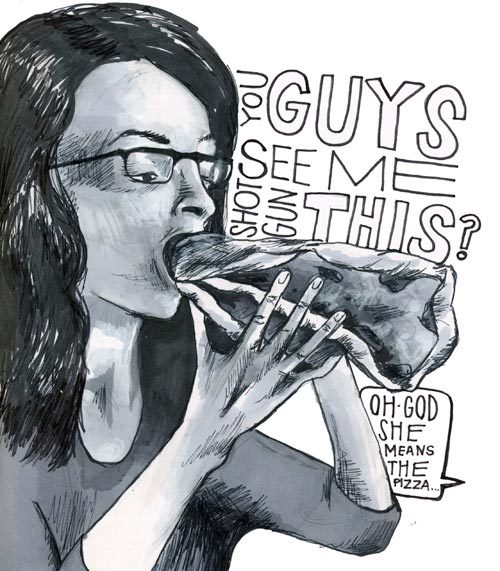
Food is big business. With unfathomable profits to be gained, corporations closely study how and what we eat.
Remember Go-Gurt?
The tubed yogurt of middle school days is a prime example of a shift in how we eat. Increasingly, Americans eat on the go and, as we age into the rigmarole of adulthood, alone.
In fact, eating solo has become so ubiquitous that most people hardly notice it anymore.
I was eating at the Bell Memorial Union the other day.
Looking around, I saw most of my peers sitting at tables by themselves, plugged into phones, hunched over and eating with somber resignation.
I was alone as well, but at least I was giving my burrito the full attention a good meal deserves.
People across the nation, in offices, break rooms and on college campuses split their attention between the food they are eating and their iPhones, tablets or computers.

This is a trend that started when television carved its place in the American household. Although the technology has changed, it doesn’t replace the feeling of enjoying one of life’s central joys with another human being.
There are South Korean Web shows for people who have acknowledged the reality of loneliness while eating in the 21st century. Subscribers tune in to live streaming food shows — not cooking programs, but eating shows in which the viewers can chat with a host who is enjoying an actual feast somewhere else.
Sounds weird, right? But the real weirdness is in the fact that food is so abundant for most Americans that it’s almost invisible. It’s eaten mindlessly, out of boredom, on the way to class, in class and in the dead of night.
Sometimes, the Chico blackout zombie hunger can only be satisfied with a personal pizza or a greasy burrito.
Regardless of occasional drunken munching, we should be able to consider how to negotiate a consumer culture in which corporations are competing for the limited space in our stomachs.
It has led to the replacement of mealtime with snacking.
Most aisles in grocery stores are filled with processed foods designed to hack taste buds and short-circuit brains at the expense of good health.
Although corporations like Kraft manipulate what we eat by targeting ingredients like sugar, salt and fat, how we eat is shaped by other forces.
Time is one of them. Like many students, I’m pretty busy most of the time.
As much as I’d like to phone a buddy for a burger and a beer between classes and work, the window of schedule overlap is small. Pondering the future, a voice in the back of my head wonders, “Is it going to be like this forever?”
I guess eating alone has its advantages. I can eat whatever I want, be as messy as I like and I don’t have to share. So, if you see me hoarding a bag of donuts in a dark corner of the library, no, you can’t have any.
Kevin Crittenden can be reached at [email protected] or @kevlodius on Twitter.








